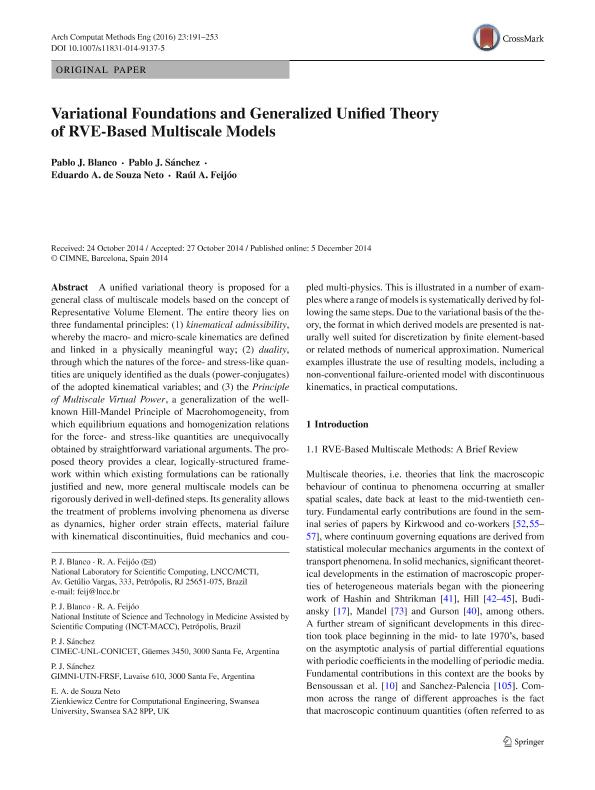Mostrar el registro sencillo del ítem
dc.contributor.author
Blanco, Pablo Javier

dc.contributor.author
Sánchez, Pablo Javier

dc.contributor.author
De Souza Neto, Eduardo Alberto

dc.contributor.author
Feijóo, Raúl Antonino

dc.date.available
2018-03-07T22:25:12Z
dc.date.issued
2016-06
dc.identifier.citation
Blanco, Pablo Javier; Sánchez, Pablo Javier; De Souza Neto, Eduardo Alberto; Feijóo, Raúl Antonino; Variational Foundations and Generalized Unified Theory of RVE-Based Multiscale Models; Springer; Archives Of Computational Methods In Engineering; 23; 2; 6-2016; 191-253
dc.identifier.issn
1134-3060
dc.identifier.uri
http://hdl.handle.net/11336/38255
dc.description.abstract
A unified variational theory is proposed for a general class of multiscale models based on the concept of Representative Volume Element. The entire theory lies on three fundamental principles: (1) kinematical admissibility, whereby the macro- and micro-scale kinematics are defined and linked in a physically meaningful way; (2) duality, through which the natures of the force- and stress-like quantities are uniquely identified as the duals (power-conjugates) of the adopted kinematical variables; and (3) the Principle of Multiscale Virtual Power, a generalization of the well-known Hill-Mandel Principle of Macrohomogeneity, from which equilibrium equations and homogenization relations for the force- and stress-like quantities are unequivocally obtained by straightforward variational arguments. The proposed theory provides a clear, logically-structured framework within which existing formulations can be rationally justified and new, more general multiscale models can be rigorously derived in well-defined steps. Its generality allows the treatment of problems involving phenomena as diverse as dynamics, higher order strain effects, material failure with kinematical discontinuities, fluid mechanics and coupled multi-physics. This is illustrated in a number of examples where a range of models is systematically derived by following the same steps. Due to the variational basis of the theory, the format in which derived models are presented is naturally well suited for discretization by finite element-based or related methods of numerical approximation. Numerical examples illustrate the use of resulting models, including a non-conventional failure-oriented model with discontinuous kinematics, in practical computations.
dc.format
application/pdf
dc.language.iso
eng
dc.publisher
Springer

dc.rights
info:eu-repo/semantics/openAccess
dc.rights.uri
https://creativecommons.org/licenses/by-nc-sa/2.5/ar/
dc.subject
Multiscale
dc.subject
Variational Formulations
dc.subject.classification
Ingeniería de Sistemas y Comunicaciones

dc.subject.classification
Ingeniería Eléctrica, Ingeniería Electrónica e Ingeniería de la Información

dc.subject.classification
INGENIERÍAS Y TECNOLOGÍAS

dc.title
Variational Foundations and Generalized Unified Theory of RVE-Based Multiscale Models
dc.type
info:eu-repo/semantics/article
dc.type
info:ar-repo/semantics/artículo
dc.type
info:eu-repo/semantics/publishedVersion
dc.date.updated
2018-03-07T15:54:02Z
dc.identifier.eissn
1886-1784
dc.journal.volume
23
dc.journal.number
2
dc.journal.pagination
191-253
dc.journal.pais
Países Bajos

dc.journal.ciudad
Amsterdam
dc.description.fil
Fil: Blanco, Pablo Javier. Laboratório Nacional de Computação Científica; Brasil. Instituto Nacional de Ciência e Tecnologia em Medicina Assistida por Computação Científica; Brasil
dc.description.fil
Fil: Sánchez, Pablo Javier. Consejo Nacional de Investigaciones Científicas y Técnicas. Centro Científico Tecnológico Conicet - Santa Fe. Centro de Investigaciones en Métodos Computacionales. Universidad Nacional del Litoral. Centro de Investigaciones en Métodos Computacionales; Argentina. Universidad Tecnológica Nacional; Argentina
dc.description.fil
Fil: De Souza Neto, Eduardo Alberto. Swansea University; Reino Unido
dc.description.fil
Fil: Feijóo, Raúl Antonino. Laboratório Nacional de Computação Científica; Brasil. Instituto Nacional de Ciência e Tecnologia em Medicina Assistida por Computação Científica; Brasil
dc.journal.title
Archives Of Computational Methods In Engineering

dc.relation.alternativeid
info:eu-repo/semantics/altIdentifier/doi/http://dx.doi.org/10.1007/s11831-014-9137-5
dc.relation.alternativeid
info:eu-repo/semantics/altIdentifier/url/https://link.springer.com/article/10.1007%2Fs11831-014-9137-5
Archivos asociados
